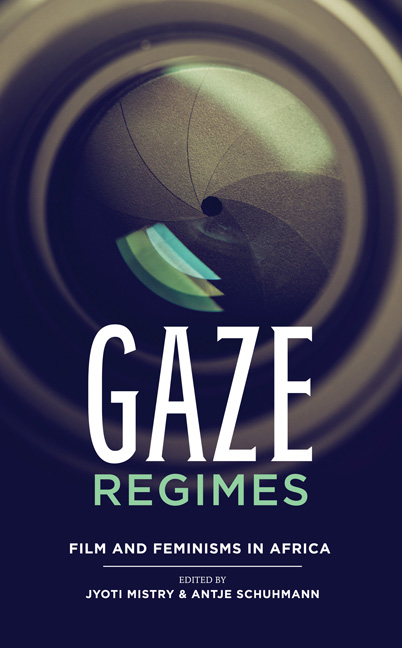Book contents
- Frontmatter
- Contents
- Acknowledgements
- Foreword: Goethe-Institut sub-Saharan Africa
- Introduction: By way of context and content
- 1 African Women in Cinema: An overview
- 2 ‘I am a feminist only in secret’
- 3 Staged Authenticity: Femininity in photography and film
- 4 ‘Power is in your own hands’: Why Jihan El-Tahri does not like movements
- 5 Aftermath – A focus on collective trauma
- 6 Shooting Violence and Trauma: Traversing visual and social topographies in Zanele Muholi's work
- 7 Puk Nini – A Filmic Instruction in Seduction: Exploring class and sexuality in gender relations
- 8 I am Saartjie Baartman
- 9 Filmmaking at the Margins of a Community: On co-producing Elelwani
- 10 On Collective Practice and Collected Reflections
- 11 ‘Cinema of resistance’
- 12 Dark and Personal
- 13 ‘Change? This might mean to shove a few men out’
- 14 Barakat! means Enough!
- 15 ‘Women, use the gaze to change reality’
- 16 Post-colonial Film Collaboration and Festival Politics
- 17 Tsitsi Dangarembga: A manifesto
- Acronyms and Abbreviations
- List of Contributors
- Filmography
- Index
12 - Dark and Personal
Published online by Cambridge University Press: 20 April 2018
- Frontmatter
- Contents
- Acknowledgements
- Foreword: Goethe-Institut sub-Saharan Africa
- Introduction: By way of context and content
- 1 African Women in Cinema: An overview
- 2 ‘I am a feminist only in secret’
- 3 Staged Authenticity: Femininity in photography and film
- 4 ‘Power is in your own hands’: Why Jihan El-Tahri does not like movements
- 5 Aftermath – A focus on collective trauma
- 6 Shooting Violence and Trauma: Traversing visual and social topographies in Zanele Muholi's work
- 7 Puk Nini – A Filmic Instruction in Seduction: Exploring class and sexuality in gender relations
- 8 I am Saartjie Baartman
- 9 Filmmaking at the Margins of a Community: On co-producing Elelwani
- 10 On Collective Practice and Collected Reflections
- 11 ‘Cinema of resistance’
- 12 Dark and Personal
- 13 ‘Change? This might mean to shove a few men out’
- 14 Barakat! means Enough!
- 15 ‘Women, use the gaze to change reality’
- 16 Post-colonial Film Collaboration and Festival Politics
- 17 Tsitsi Dangarembga: A manifesto
- Acronyms and Abbreviations
- List of Contributors
- Filmography
- Index
Summary
Notwithstanding natural disasters, 2010 was an exceptional year, particularly for women in film. Firstly, Kathryn Bigelow broke the gender divide and became the only woman ever to win Best Director at the Academy Awards of Motion Picture Arts and Sciences. Not long after this, a group of African women directors got together for a conference in Johannesburg and took part in a first-of-its-kind film festival showcasing African women directors, organised by Women of the Sun. The first event got extensive international attention, which was well deserved. The second felt like a bit of a clandestine operation. Ten years into the 21st century it seems that films made by African women, with one or two exceptions, are not able to draw crowds. The world is just not ready.
In fact it is worth asking whether the world will ever be ready, en masse, to sample the curio that is African women's cinema, when it appears to be no easy feat to persuade South Africans to watch South African movies on the big screen. Perhaps people were confused about the very term ‘African women's cinema’ and wondered: will it all look and sound the same? I once went to a women's spoken poetry evening where most of the poems made reference to menstrual blood and infidelity, and even though I have experienced both, I can relate to the anxiety that there could be a common theme within films grouped under a ‘made by a woman’ banner.
Actually, the broad span of films that women on this continent make only goes to prove that they are as diverse in story, tone and style as the experiences and world views of the people who make them. Would we consider placing all black filmmakers under one aesthetic umbrella and attempt to argue that there's a black film style or a black approach to making films? If so, what do we do with Indian film? Indians in the history of South Africa are politically black too. Do you see what we are up against? If we narrow it down and discount formulaic, star-driven, actionpacked commercial models and place our focus on independent films, can we find a unifying gender aesthetic, a single gender category?
- Type
- Chapter
- Information
- Gaze RegimesFilm and feminisms in Africa, pp. 161 - 167Publisher: Wits University PressPrint publication year: 2015

